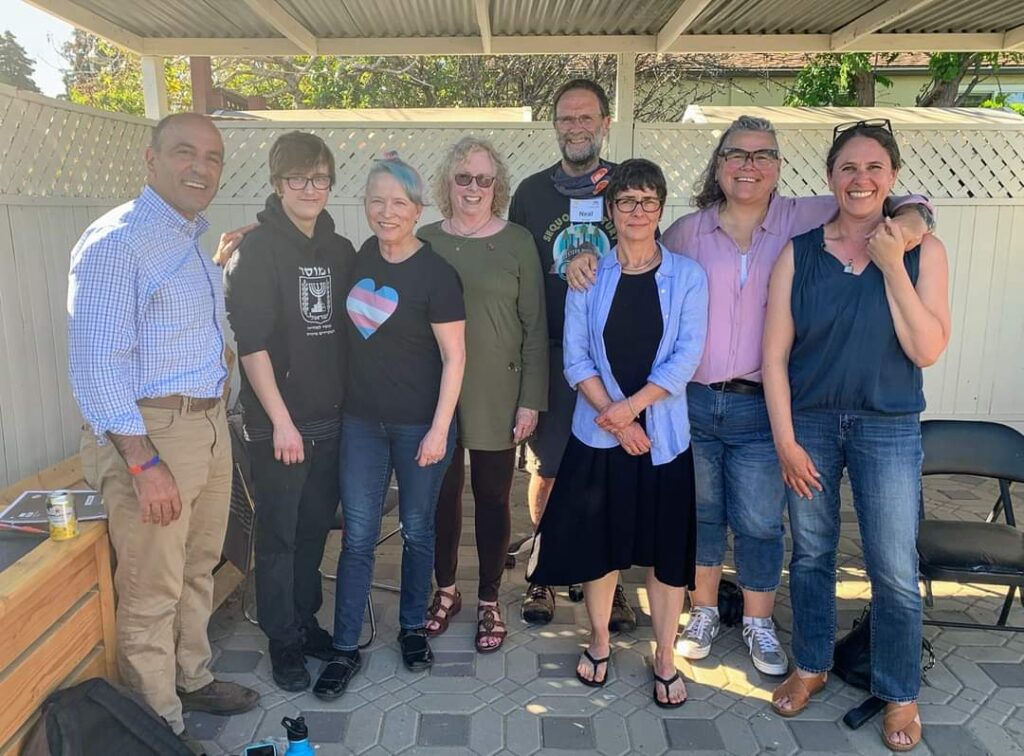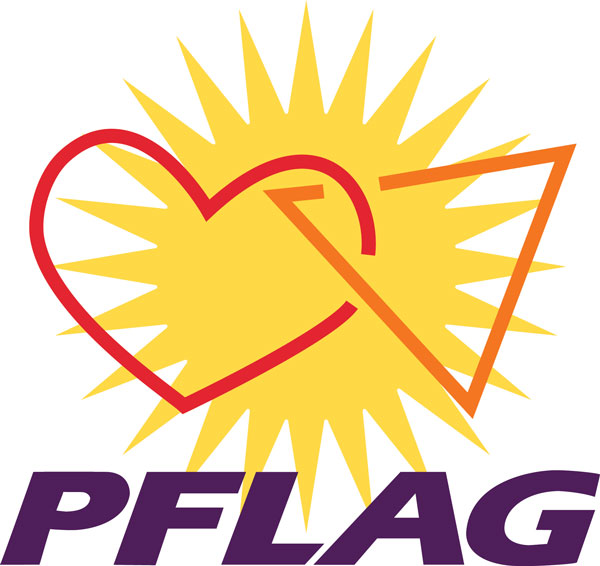
Recently, Rep. Jimmy Panetta reached out to PFLAG to suggest a listening session about issues faced by transgender people, their families, and their communities. The meeting took place in the back yard of the Diversity Center with representatives from PFLAG Santa Cruz County and the TransFamilies of Santa Cruz County,. We were graced with the fun sounds of a live band at the regular Friday midtown street party in the parking lot next door.
The goal of the meeting was not necessarily to solve any problems, but at least to gain a sympathetic ear and educate a politician about transgender concerns. Concerns that were discussed at length included three broad areas: healthcare policy, educational outreach, and continuing issues with access to support.
Healthcare policy
Andrea Damon of the TransFamilies of Santa Cruz County cited a statistic from the Kaiser Family Foundation that in 2020: 67% of workers who got their health coverage through their private employer were in self-funded plans. What this means is that instead of contracting with a health insurance company to provide insurance to employees, the business creates its own healthcare group. These groups are not necessarily covered by federal or state law governing health insurance.
If you’re thinking ahead, you already know what comes next: many of these plans do not follow mandates written to regulate health insurance, including health coverage for transgender care mandated under the ACA. Often, business owners don’t realize there is an exclusion, and willingly add trans care when confronted. However, other owners can legally refuse to cover trans care through their self-funded plan.
Most workers have no idea that their “health insurance” isn’t legally required to cover transgender care, and it’s only when they are in crisis with a transgender child that they face barriers to getting appropriate, timely care for their children.
“TransFamilies has worked with several families over the last year who were faced with coverage being denied through their self-funded plans,” Damon says. Results have been mixed; some employers willingly added coverage, while in others, TransFamilies had to “apply pressure” to the board of directors, ultimately convincing two such employers to add coverage.
Rep. Panetta made an enthusiastic request to know more about when self-funded insurance isn’t required to follow insurance laws/requirements, since this is an area under federal jurisdiction.
Educational outreach
Santa Cruz County boasts a robust LGBTQ+ educational program supported by the Diversity Center. This program, Triangle Speakers, will send a trained panel of speakers into any school for any event for free. A similar speakers program in Monterey County is provided by Rainbow Speakers and Friends.
However, access to these programs is spotty, to say the least. Rachel Morales-Warne, a parent advocate whose children attend SLV schools, said that the Triangle Speakers hasn’t been invited to the district in at least the last ten years.
All of the advocates agreed that even when intentions are good, the lack of teeth in the FAIR Education Act (CA Senate Bill 48, 2011) means that it’s up to individual teachers, schools, and districts to decide how inclusive and supportive they will be.
“As an educator, 50 years now, I find it so frustrating that schools are not following what the law says, what we expected them to be doing,” said Lynn J. Walton, retired math teacher and PFLAG SCC Executive Board member. “There are no teeth in it. A lot of teachers have good intentions, but they don’t have the tools to go to the next step. We need to train our teachers so there’s harder conversations.”
Even in “liberal Santa Cruz County,” the treatment of LGBTQ+ students, including bullying, intimidation, misgendering/naming, and shaming, is common. The County Office of Education’s focus on equity in the coming school year, advocates say, is unlikely to make a substantive difference in the everyday experiences of queer kids in our schools if the training and support is not applied more consistently.
Access to support
Michelle Brandt and Andrea Damon (TransFamilies) offered the statistics that underpin everything that advocates do: Kids who grow up in families that support and affirm their gender have wildly better outcomes than kids who don’t.
“Having an affirming, accepting family is the number one indicator for a young person’s mental health, so that’s a big part of what we all do,” Andrea Damon explained. “PFLAG, TransFamiies, and the Diversity Center: for the kids—through the parents but for the kids.”
But support is applied unequally and sometimes it feels like parents have to keep refighting battles that had already been fought by a previous parent.
“You get tired and think, I can’t do this anymore,” Michelle Brandt says.
Rachel Morales-Warne responded more colorfully. “In our house, pardon my language, but I’m like, We’re fuckin’ still doing this?”
Neal Savage, also a PFLAG Santa Cruz board member, pointed out that the way to reach parents in the past doesn’t suit today’s parent population. “When you start expanding the population into Latinx and any kids who are in foster care, those families and those kids aren’t getting help. The number of families that can afford to go someplace on a Tuesday night for a meeting has gotten very small, given geography, money, two jobs. The PFLAG model from 30 years ago is in some ways a middle-class luxury.”
Morales-Warne agrees. “I talk to a cousin’s friend of a cousin because I have a child, because they can’t afford to go to these meetings or they don’t feel comfortable. It’s not necessarily a safe space to live in. I think some of the biggest obstacles are education and language. Not just language as in bilingual language, but the language around what it means to be nonbinary or trans or queer or gay or pan.”
Some takeaways
Rep. Panetta’s job is federal, which informs the areas where he is able to exert influence. Listening to the advocates at the meeting, he responded, “You see the continued need for the resources that are so necessary.” He shared his memories of a powerful meeting the week before about LGBTQ+ experiences moderated by our local State Senator John Laird and hosted by the Diversity Center.
It’s clear that transgender children and adults will benefit from a more focused, united push for understanding, inclusion, and legal protection.






